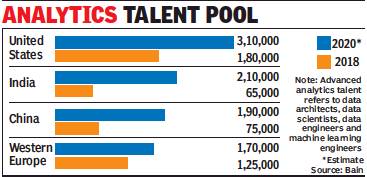Analytics industry: India
This is a collection of articles archived for the excellence of their content. |
The advanced analytics talent pool
As in 2018
Shilpa Phadnis & Sujit John, July 13, 2019: The Times of India

From: Shilpa Phadnis & Sujit John, July 13, 2019: The Times of India
The worldwide advanced analytics talent pool is expected to reach 1 million people in 2020 — double of the 2018 level — and much of that is coming from India, says a report by global consultancy firm Bain & Company.
Until now, the US was the leading source of advanced analytics-trained talent. In the future, much of the growth will occur outside the US, the report says. “India’s rapidly expanding pool of advanced analytics talent puts it in a position to become a global leader in the field,” says Bain. “With the right focus on talent development, government support and regulation, India could become more than a source of quantities of talent. It could be the trusted provider of sophisticated analytical services to its own companies and the world’s,” the report says.
Bain said two trends are amplifying the talent pool in India. “First, STEM (science, technology, engineering, mathematics) undergraduate and graduate degree holders, whose programmes of study emphasise data and analytics skills, continue to join the workforce in increasing numbers. Augmenting that is India’s deep existing ecosystem in information technology, especially in programming and systems integration. Outsourcing firms and the India IT centres of global corporations house many ideal candidates for learning new advanced analytics skills,” say the report’s authors Chris Brahm, Arpan Sheth, Velu Sinha and Jessica Dai.
A big impetus, they say, was the government’s push for Digital India and PEs buying into India’s analytics growth story early on. PE player General Atlantic bought 20% stake in Bengaluru-based MuSigma. Fractal Analytics, Crayon Data, Latent View and AbsolutData were other Indian analytics firms that have made a sizeable presence in the market.
Arpan Sheth, partner in Bain & Company, told TOI data privacy and security norms were holding back India’s full potential as a global centre of analytics. “We need norms and laws to protect consumer data with strong enforcement from the Reserve Bank of India and other regulators,” he said.
The report says the country must create a regulatory framework that establishes Indian firms as not just skilled but also trustworthy. “With new data protection regulations in place in Europe and coming soon to California and other jurisdictions, India has an opportunity to take the lead by setting standards for data use and curation, and for how analytics are delivered,” the report says.
The first step, it says, is for India’s analytics industry, in conjunction with the government, to adopt data security protocols, standards and certification to minimise risk of data misuse and privacy or security breaches.